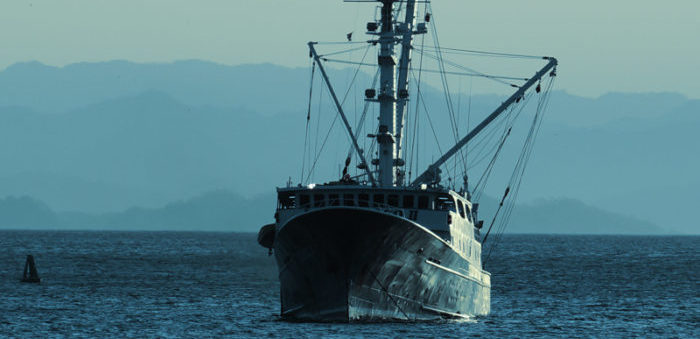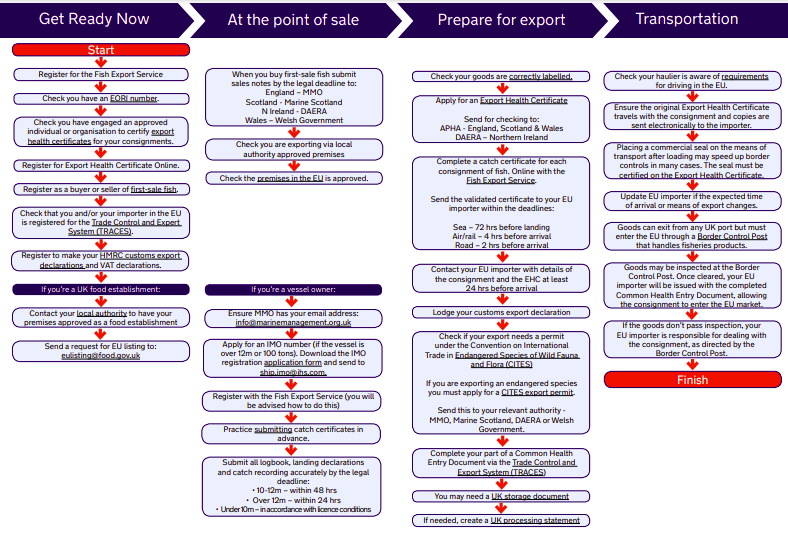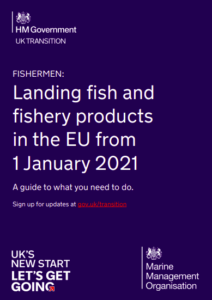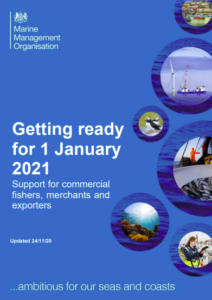From 1 January 2021, the UK will have sole responsibility for its seas and fishing industry and we need to be ready for change. As such, the UK Merchant Marine Organisation (MMO) issued a guide for commercial fishers, merchants and exporters with the steps they must take to ensure their business continues to prosper.
This is part of a series of guides by MMO to signpost the steps commercial fishers and seafood exporters may need to take to continue trading.
For most commercial fishers there will be little immediate change, while fish and seafood exporters will need to comply with the EU’s Illegal, Unreported or Unregulated (IUU) fishing regulations and supply additional documents in order to continue to trade with customers in the EU.
Some processes will stay the same, such as UK registered vessels landing fish in UK ports, and the regulations that are in place to deter and prevent illegal fishing will not change.
Step by step guide to exporting fish and seafood products to the EU (Click to enlarge):
Firstly, for all commercial fishing, whether in the UK’s exclusive economic zone (EEZ) or elsewhere, you need to be registered and you need a licence to fish.
Recording your catch and sales
Fishers will need to submit all logbooks, landing declarations and catch records accurately by the legal deadline to be compliant. Importantly, the data on landing declarations and sales notes must match to enable UK catch certificates to be generated for catch to be exported to the EU, so it is important that fishers ensure merchants have the correct landing date for each consignment.
- Vessels under 10m – record on the catch app in accordance with your licence condition
- Vessels 10-12m – submit paper logbooks and landing declarations within 48 hours; electronic logbooks within 24 hrs
- Vessels over 12m – submit electronic logbooks and landing declarations within 24 hours of landing
- Sales notes must arrive within 24 hours of first-sale via the Electronic Reporting System or within 48 hours if submitting by post.
Logbooks, landing declarations and sales notes are vital to the future of our fish and seafood industry. The data they provide about what fish is being taken out of the sea, where and when, is the evidence the MMO and government uses to make its decisions and fight the industry’s cause – on quotas, negotiations, closures, environmental legislation, funding and grants, port developments, export approval and more.
As well as being a legal requirement to meet the deadlines, from 1 January 2021 if your documents are not in on time you could jeopardise your buyer’s ability to sell and export your catch.
Landing your catch in the UK
Any UK-registered, licensed vessel can land catch in any port in the UK. Fishing is well regulated in the UK to protect sustainable fish stocks and prevent Illegal, Unreported or Unregulated (IUU) fishing.The MMO’s Compliance and Enforcement Strategy sets out the rules for fishing in English waters.
Selling catch by auction in the UK
Anyone selling fish at auction must be registered as a buyer or seller of first-sale fish. Sales notes must be submitted by the legal deadline. They must arrive within 24 hours of sale for larger businesses and others using the Electronic Reporting System (ERS), or for smaller businesses (with a turnover of less than £200k) that are allowed to use paper sales notes, 48 hours by post. Late submission is not only illegal, it could impact the ability of your merchant to sell on your catch. It is very important that the sales note has the same landing date as the elogbook and landing declaration to enable catch certificates to be issued for export.
Landing your catch in the EU
From 1 January 2021 UK registered vessels will be able to land fish into EU ports that are designated under the North East Atlantic Fisheries Commission (NEAFC) regulations. You will need to register your vessel with NEAFC’s Port State Control System. Fresh fish can be landed into any NEAFC designated port.
If you are the Captain or Skipper of a factory or freezer vessel that is an approved food establishment, you will need to land into a Border Control Post (BCP) that can handle your type of product – check your trade route in advance and find out who the relevant EU ‘competent authority’ is.
Before landing, you must submit a prior notification to the EU Competent Authority up to 4 hours ahead for fresh fish and up to 72 hours ahead for frozen fish. And you need to submit a pre-landing declaration at least 4 hours ahead.
Local Authority approved freezer, reefer or factory vessels that land frozen or processed fish directly into the EU will also require a Captain’s Certificate signed by the Captain who is authorised by APHA (Animal and Plant Health Agency) or DAERA (Department of Agriculture, Environment and RuralAffairs).
Complete a UK catch certificate for the catch you intend to land. See the MMO’s handy checklist for landing fish and fishery products in the EU from 1 January 2021.
Explore more herebelow:

































































